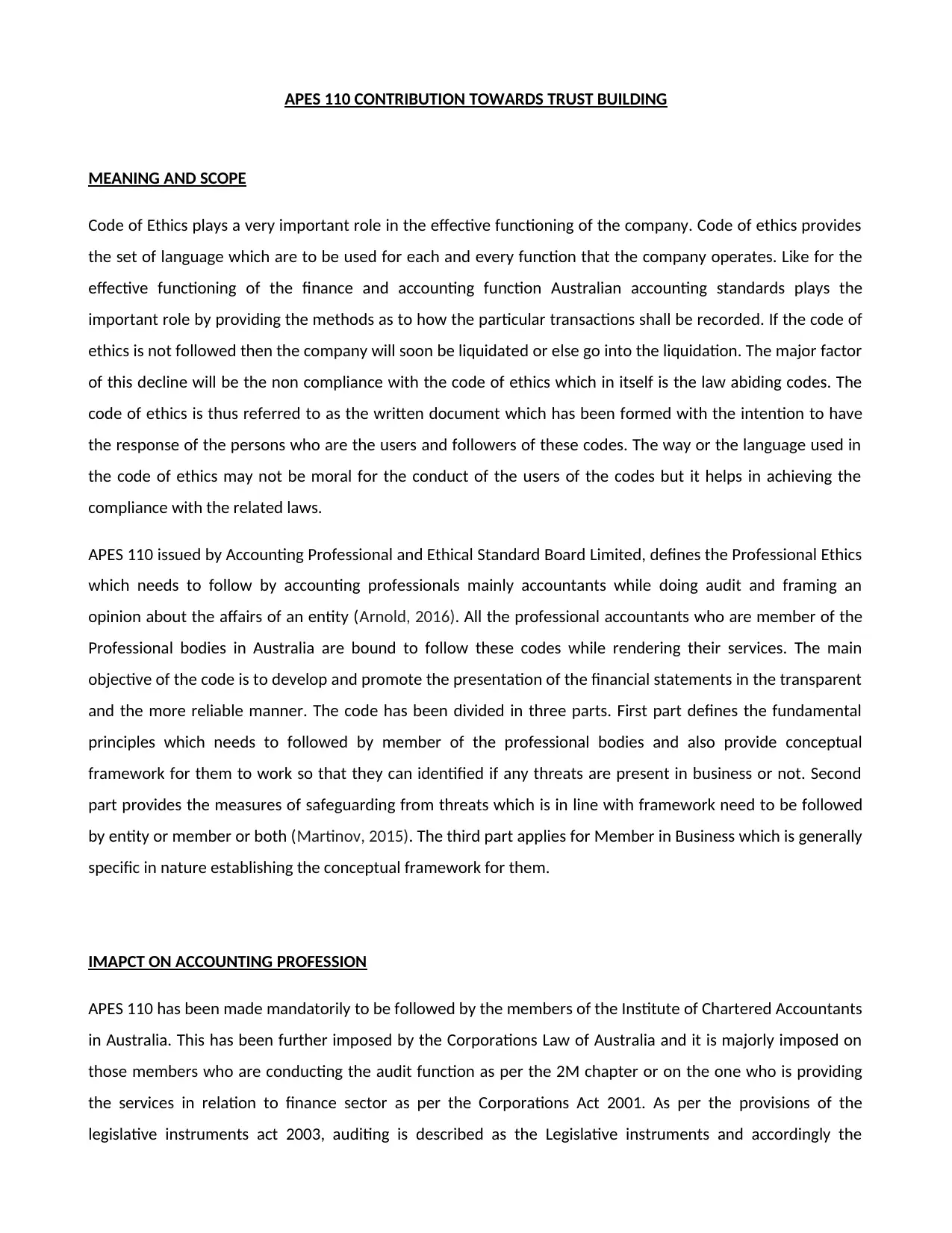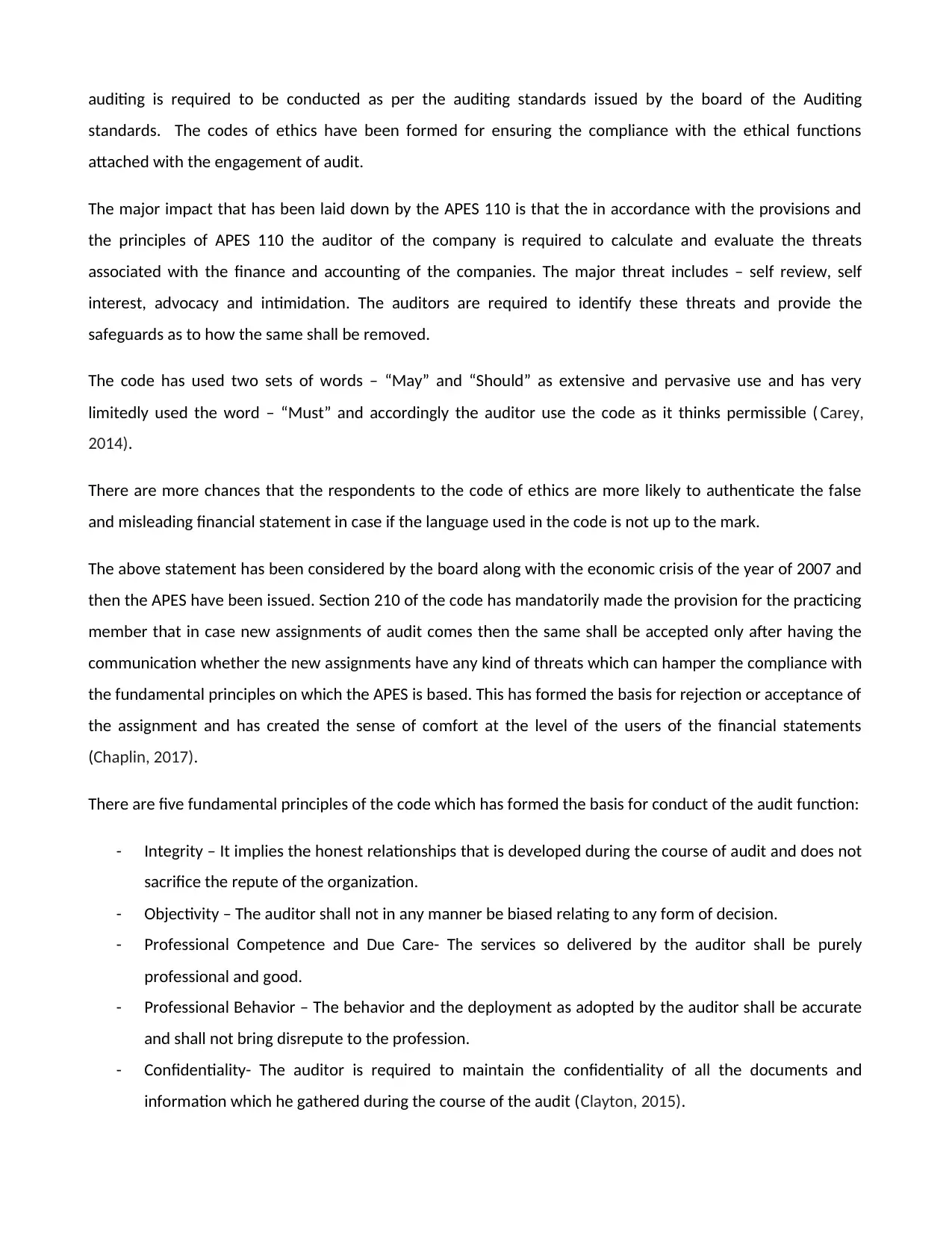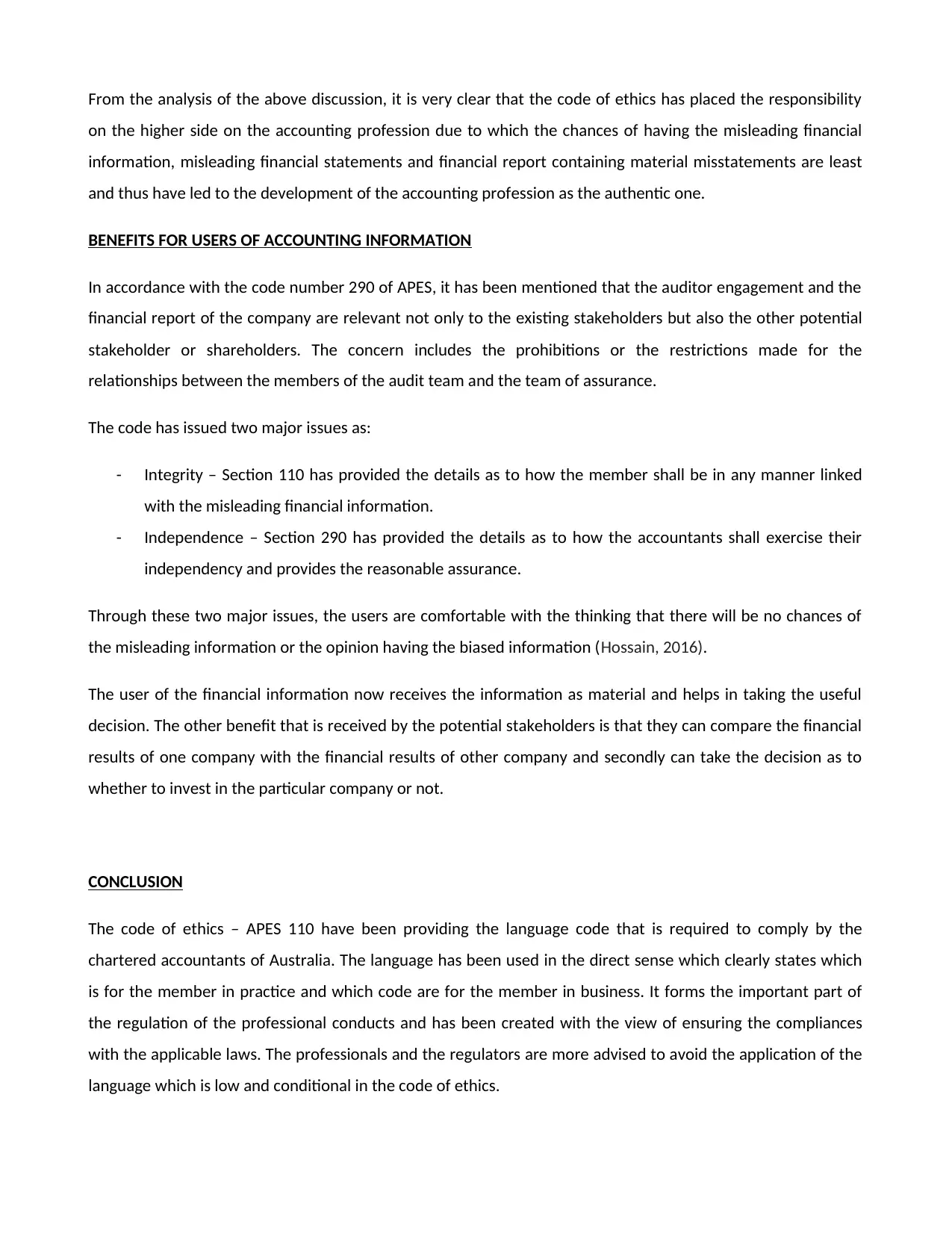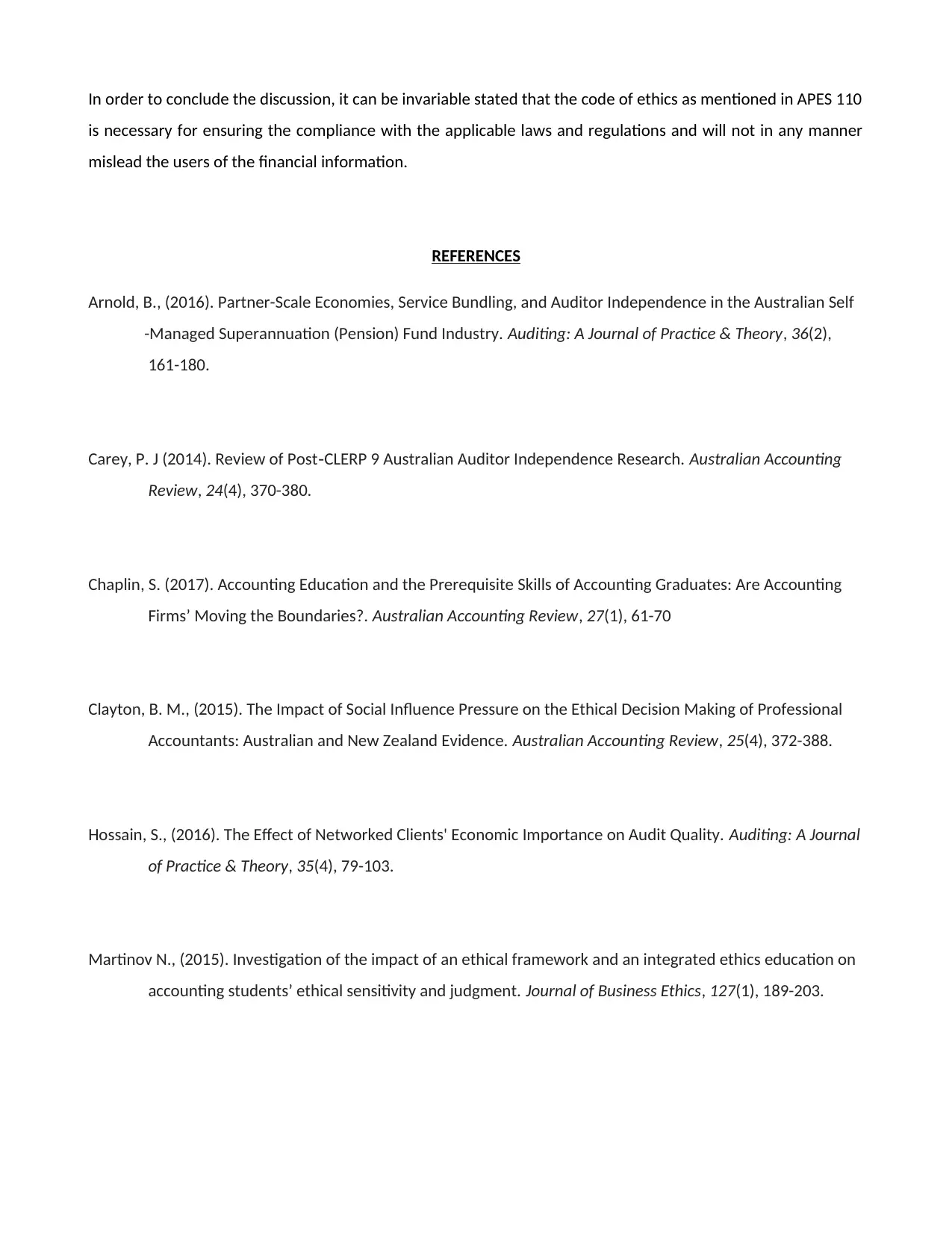APES 110: Enhancing Public Trust through Accounting Ethics & Standards
VerifiedAdded on 2023/06/07
|4
|1655
|326
Essay
AI Summary
This essay examines the role of APES 110, the Code of Ethics for Professional Accountants in Australia, in fostering public trust in the accounting profession. It highlights how APES 110, issued by the Accounting Professional and Ethical Standards Board Limited, mandates ethical conduct for accounting professionals, particularly in auditing and financial statement presentation. The code emphasizes fundamental principles like integrity, objectivity, professional competence, behavior, and confidentiality, impacting the accounting profession by requiring auditors to identify and safeguard against threats such as self-review, self-interest, advocacy, and intimidation. The essay further discusses the benefits for users of accounting information, ensuring transparency and reliability, enabling informed decision-making, and facilitating comparisons between companies. It concludes that APES 110 is crucial for compliance with laws and regulations, preventing misleading financial information, and enhancing the credibility of the accounting profession.

APES 110 CONTRIBUTION TOWARDS TRUST BUILDING
MEANING AND SCOPE
Code of Ethics plays a very important role in the effective functioning of the company. Code of ethics provides
the set of language which are to be used for each and every function that the company operates. Like for the
effective functioning of the finance and accounting function Australian accounting standards plays the
important role by providing the methods as to how the particular transactions shall be recorded. If the code of
ethics is not followed then the company will soon be liquidated or else go into the liquidation. The major factor
of this decline will be the non compliance with the code of ethics which in itself is the law abiding codes. The
code of ethics is thus referred to as the written document which has been formed with the intention to have
the response of the persons who are the users and followers of these codes. The way or the language used in
the code of ethics may not be moral for the conduct of the users of the codes but it helps in achieving the
compliance with the related laws.
APES 110 issued by Accounting Professional and Ethical Standard Board Limited, defines the Professional Ethics
which needs to follow by accounting professionals mainly accountants while doing audit and framing an
opinion about the affairs of an entity (Arnold, 2016). All the professional accountants who are member of the
Professional bodies in Australia are bound to follow these codes while rendering their services. The main
objective of the code is to develop and promote the presentation of the financial statements in the transparent
and the more reliable manner. The code has been divided in three parts. First part defines the fundamental
principles which needs to followed by member of the professional bodies and also provide conceptual
framework for them to work so that they can identified if any threats are present in business or not. Second
part provides the measures of safeguarding from threats which is in line with framework need to be followed
by entity or member or both (Martinov, 2015). The third part applies for Member in Business which is generally
specific in nature establishing the conceptual framework for them.
IMAPCT ON ACCOUNTING PROFESSION
APES 110 has been made mandatorily to be followed by the members of the Institute of Chartered Accountants
in Australia. This has been further imposed by the Corporations Law of Australia and it is majorly imposed on
those members who are conducting the audit function as per the 2M chapter or on the one who is providing
the services in relation to finance sector as per the Corporations Act 2001. As per the provisions of the
legislative instruments act 2003, auditing is described as the Legislative instruments and accordingly the
MEANING AND SCOPE
Code of Ethics plays a very important role in the effective functioning of the company. Code of ethics provides
the set of language which are to be used for each and every function that the company operates. Like for the
effective functioning of the finance and accounting function Australian accounting standards plays the
important role by providing the methods as to how the particular transactions shall be recorded. If the code of
ethics is not followed then the company will soon be liquidated or else go into the liquidation. The major factor
of this decline will be the non compliance with the code of ethics which in itself is the law abiding codes. The
code of ethics is thus referred to as the written document which has been formed with the intention to have
the response of the persons who are the users and followers of these codes. The way or the language used in
the code of ethics may not be moral for the conduct of the users of the codes but it helps in achieving the
compliance with the related laws.
APES 110 issued by Accounting Professional and Ethical Standard Board Limited, defines the Professional Ethics
which needs to follow by accounting professionals mainly accountants while doing audit and framing an
opinion about the affairs of an entity (Arnold, 2016). All the professional accountants who are member of the
Professional bodies in Australia are bound to follow these codes while rendering their services. The main
objective of the code is to develop and promote the presentation of the financial statements in the transparent
and the more reliable manner. The code has been divided in three parts. First part defines the fundamental
principles which needs to followed by member of the professional bodies and also provide conceptual
framework for them to work so that they can identified if any threats are present in business or not. Second
part provides the measures of safeguarding from threats which is in line with framework need to be followed
by entity or member or both (Martinov, 2015). The third part applies for Member in Business which is generally
specific in nature establishing the conceptual framework for them.
IMAPCT ON ACCOUNTING PROFESSION
APES 110 has been made mandatorily to be followed by the members of the Institute of Chartered Accountants
in Australia. This has been further imposed by the Corporations Law of Australia and it is majorly imposed on
those members who are conducting the audit function as per the 2M chapter or on the one who is providing
the services in relation to finance sector as per the Corporations Act 2001. As per the provisions of the
legislative instruments act 2003, auditing is described as the Legislative instruments and accordingly the
Paraphrase This Document
Need a fresh take? Get an instant paraphrase of this document with our AI Paraphraser

auditing is required to be conducted as per the auditing standards issued by the board of the Auditing
standards. The codes of ethics have been formed for ensuring the compliance with the ethical functions
attached with the engagement of audit.
The major impact that has been laid down by the APES 110 is that the in accordance with the provisions and
the principles of APES 110 the auditor of the company is required to calculate and evaluate the threats
associated with the finance and accounting of the companies. The major threat includes – self review, self
interest, advocacy and intimidation. The auditors are required to identify these threats and provide the
safeguards as to how the same shall be removed.
The code has used two sets of words – “May” and “Should” as extensive and pervasive use and has very
limitedly used the word – “Must” and accordingly the auditor use the code as it thinks permissible ( Carey,
2014).
There are more chances that the respondents to the code of ethics are more likely to authenticate the false
and misleading financial statement in case if the language used in the code is not up to the mark.
The above statement has been considered by the board along with the economic crisis of the year of 2007 and
then the APES have been issued. Section 210 of the code has mandatorily made the provision for the practicing
member that in case new assignments of audit comes then the same shall be accepted only after having the
communication whether the new assignments have any kind of threats which can hamper the compliance with
the fundamental principles on which the APES is based. This has formed the basis for rejection or acceptance of
the assignment and has created the sense of comfort at the level of the users of the financial statements
(Chaplin, 2017).
There are five fundamental principles of the code which has formed the basis for conduct of the audit function:
- Integrity – It implies the honest relationships that is developed during the course of audit and does not
sacrifice the repute of the organization.
- Objectivity – The auditor shall not in any manner be biased relating to any form of decision.
- Professional Competence and Due Care- The services so delivered by the auditor shall be purely
professional and good.
- Professional Behavior – The behavior and the deployment as adopted by the auditor shall be accurate
and shall not bring disrepute to the profession.
- Confidentiality- The auditor is required to maintain the confidentiality of all the documents and
information which he gathered during the course of the audit (Clayton, 2015).
standards. The codes of ethics have been formed for ensuring the compliance with the ethical functions
attached with the engagement of audit.
The major impact that has been laid down by the APES 110 is that the in accordance with the provisions and
the principles of APES 110 the auditor of the company is required to calculate and evaluate the threats
associated with the finance and accounting of the companies. The major threat includes – self review, self
interest, advocacy and intimidation. The auditors are required to identify these threats and provide the
safeguards as to how the same shall be removed.
The code has used two sets of words – “May” and “Should” as extensive and pervasive use and has very
limitedly used the word – “Must” and accordingly the auditor use the code as it thinks permissible ( Carey,
2014).
There are more chances that the respondents to the code of ethics are more likely to authenticate the false
and misleading financial statement in case if the language used in the code is not up to the mark.
The above statement has been considered by the board along with the economic crisis of the year of 2007 and
then the APES have been issued. Section 210 of the code has mandatorily made the provision for the practicing
member that in case new assignments of audit comes then the same shall be accepted only after having the
communication whether the new assignments have any kind of threats which can hamper the compliance with
the fundamental principles on which the APES is based. This has formed the basis for rejection or acceptance of
the assignment and has created the sense of comfort at the level of the users of the financial statements
(Chaplin, 2017).
There are five fundamental principles of the code which has formed the basis for conduct of the audit function:
- Integrity – It implies the honest relationships that is developed during the course of audit and does not
sacrifice the repute of the organization.
- Objectivity – The auditor shall not in any manner be biased relating to any form of decision.
- Professional Competence and Due Care- The services so delivered by the auditor shall be purely
professional and good.
- Professional Behavior – The behavior and the deployment as adopted by the auditor shall be accurate
and shall not bring disrepute to the profession.
- Confidentiality- The auditor is required to maintain the confidentiality of all the documents and
information which he gathered during the course of the audit (Clayton, 2015).

From the analysis of the above discussion, it is very clear that the code of ethics has placed the responsibility
on the higher side on the accounting profession due to which the chances of having the misleading financial
information, misleading financial statements and financial report containing material misstatements are least
and thus have led to the development of the accounting profession as the authentic one.
BENEFITS FOR USERS OF ACCOUNTING INFORMATION
In accordance with the code number 290 of APES, it has been mentioned that the auditor engagement and the
financial report of the company are relevant not only to the existing stakeholders but also the other potential
stakeholder or shareholders. The concern includes the prohibitions or the restrictions made for the
relationships between the members of the audit team and the team of assurance.
The code has issued two major issues as:
- Integrity – Section 110 has provided the details as to how the member shall be in any manner linked
with the misleading financial information.
- Independence – Section 290 has provided the details as to how the accountants shall exercise their
independency and provides the reasonable assurance.
Through these two major issues, the users are comfortable with the thinking that there will be no chances of
the misleading information or the opinion having the biased information (Hossain, 2016).
The user of the financial information now receives the information as material and helps in taking the useful
decision. The other benefit that is received by the potential stakeholders is that they can compare the financial
results of one company with the financial results of other company and secondly can take the decision as to
whether to invest in the particular company or not.
CONCLUSION
The code of ethics – APES 110 have been providing the language code that is required to comply by the
chartered accountants of Australia. The language has been used in the direct sense which clearly states which
is for the member in practice and which code are for the member in business. It forms the important part of
the regulation of the professional conducts and has been created with the view of ensuring the compliances
with the applicable laws. The professionals and the regulators are more advised to avoid the application of the
language which is low and conditional in the code of ethics.
on the higher side on the accounting profession due to which the chances of having the misleading financial
information, misleading financial statements and financial report containing material misstatements are least
and thus have led to the development of the accounting profession as the authentic one.
BENEFITS FOR USERS OF ACCOUNTING INFORMATION
In accordance with the code number 290 of APES, it has been mentioned that the auditor engagement and the
financial report of the company are relevant not only to the existing stakeholders but also the other potential
stakeholder or shareholders. The concern includes the prohibitions or the restrictions made for the
relationships between the members of the audit team and the team of assurance.
The code has issued two major issues as:
- Integrity – Section 110 has provided the details as to how the member shall be in any manner linked
with the misleading financial information.
- Independence – Section 290 has provided the details as to how the accountants shall exercise their
independency and provides the reasonable assurance.
Through these two major issues, the users are comfortable with the thinking that there will be no chances of
the misleading information or the opinion having the biased information (Hossain, 2016).
The user of the financial information now receives the information as material and helps in taking the useful
decision. The other benefit that is received by the potential stakeholders is that they can compare the financial
results of one company with the financial results of other company and secondly can take the decision as to
whether to invest in the particular company or not.
CONCLUSION
The code of ethics – APES 110 have been providing the language code that is required to comply by the
chartered accountants of Australia. The language has been used in the direct sense which clearly states which
is for the member in practice and which code are for the member in business. It forms the important part of
the regulation of the professional conducts and has been created with the view of ensuring the compliances
with the applicable laws. The professionals and the regulators are more advised to avoid the application of the
language which is low and conditional in the code of ethics.
⊘ This is a preview!⊘
Do you want full access?
Subscribe today to unlock all pages.

Trusted by 1+ million students worldwide

In order to conclude the discussion, it can be invariable stated that the code of ethics as mentioned in APES 110
is necessary for ensuring the compliance with the applicable laws and regulations and will not in any manner
mislead the users of the financial information.
REFERENCES
Arnold, B., (2016). Partner-Scale Economies, Service Bundling, and Auditor Independence in the Australian Self
-Managed Superannuation (Pension) Fund Industry. Auditing: A Journal of Practice & Theory, 36(2),
161-180.
Carey, P. J (2014). Review of Post‐CLERP 9 Australian Auditor Independence Research. Australian Accounting
Review, 24(4), 370-380.
Chaplin, S. (2017). Accounting Education and the Prerequisite Skills of Accounting Graduates: Are Accounting
Firms’ Moving the Boundaries?. Australian Accounting Review, 27(1), 61-70
Clayton, B. M., (2015). The Impact of Social Influence Pressure on the Ethical Decision Making of Professional
Accountants: Australian and New Zealand Evidence. Australian Accounting Review, 25(4), 372-388.
Hossain, S., (2016). The Effect of Networked Clients' Economic Importance on Audit Quality. Auditing: A Journal
of Practice & Theory, 35(4), 79-103.
Martinov N., (2015). Investigation of the impact of an ethical framework and an integrated ethics education on
accounting students’ ethical sensitivity and judgment. Journal of Business Ethics, 127(1), 189-203.
is necessary for ensuring the compliance with the applicable laws and regulations and will not in any manner
mislead the users of the financial information.
REFERENCES
Arnold, B., (2016). Partner-Scale Economies, Service Bundling, and Auditor Independence in the Australian Self
-Managed Superannuation (Pension) Fund Industry. Auditing: A Journal of Practice & Theory, 36(2),
161-180.
Carey, P. J (2014). Review of Post‐CLERP 9 Australian Auditor Independence Research. Australian Accounting
Review, 24(4), 370-380.
Chaplin, S. (2017). Accounting Education and the Prerequisite Skills of Accounting Graduates: Are Accounting
Firms’ Moving the Boundaries?. Australian Accounting Review, 27(1), 61-70
Clayton, B. M., (2015). The Impact of Social Influence Pressure on the Ethical Decision Making of Professional
Accountants: Australian and New Zealand Evidence. Australian Accounting Review, 25(4), 372-388.
Hossain, S., (2016). The Effect of Networked Clients' Economic Importance on Audit Quality. Auditing: A Journal
of Practice & Theory, 35(4), 79-103.
Martinov N., (2015). Investigation of the impact of an ethical framework and an integrated ethics education on
accounting students’ ethical sensitivity and judgment. Journal of Business Ethics, 127(1), 189-203.
1 out of 4
Related Documents
Your All-in-One AI-Powered Toolkit for Academic Success.
+13062052269
info@desklib.com
Available 24*7 on WhatsApp / Email
![[object Object]](/_next/static/media/star-bottom.7253800d.svg)
Unlock your academic potential
Copyright © 2020–2026 A2Z Services. All Rights Reserved. Developed and managed by ZUCOL.





